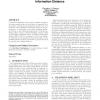Free Online Productivity Tools
i2Speak
i2Symbol
i2OCR
iTex2Img
iWeb2Print
iWeb2Shot
i2Type
iPdf2Split
iPdf2Merge
i2Bopomofo
i2Arabic
i2Style
i2Image
i2PDF
iLatex2Rtf
Sci2ools
105
click to vote
GECCO
2009
Springer
2009
Springer
Sustaining diversity using behavioral information distance
Conventional similarity metrics used to sustain diversity in evolving populations are not well suited to sequential decision tasks. Genotypes and phenotypic structure are poor predictors of how solutions will actually behave in the environment. In this paper, we propose measuring similarity directly on the behavioral trajectories of evolving candidate policies using a universal similarity measure based on algorithmic information theory: normalized compression distance (NCD). NCD is compared to four other similarity measures in both genotype and phenotype space on the POMDP Tartarus problem, and shown to produce the most fit, general, and complex solutions. Categories and Subject Descriptors I.2.8 [Artificial Intelligence]: Problem Solving, Control Methods, and Search—heuristic methods General Terms Algorithms
Artificial Intelligence | Conventional Similarity Metrics | GECCO 2009 | Similarity Measures | Universal Similarity Measure |
Related Content
| Added | 26 May 2010 |
| Updated | 26 May 2010 |
| Type | Conference |
| Year | 2009 |
| Where | GECCO |
| Authors | Faustino J. Gomez |
Comments (0)

